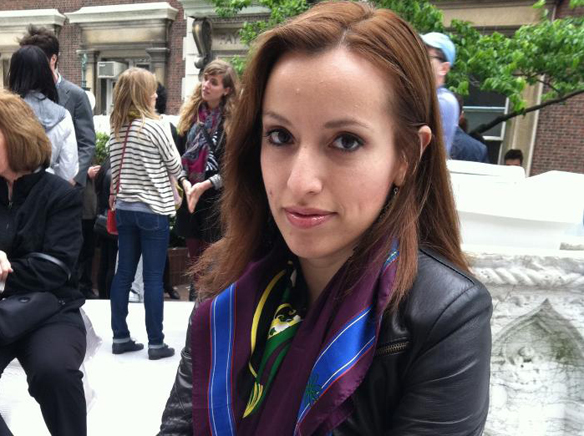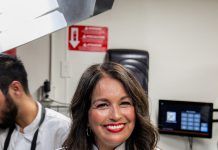Urban planning, poverty reduction and reproductive rights are not new advocacies for Claudia Huerta from Santee. But her broad experience working and campaigning for low-income and underserved communities in California, New York, Mexico and Brazil landed Huerta a position where she can utilize all of these skills.
Urban planning, poverty reduction and reproductive rights are not new advocacies for Claudia Huerta from Santee. But her broad experience working and campaigning for low-income and underserved communities in California, New York, Mexico and Brazil landed Huerta a position where she can utilize all of these skills.
As the Binational Affairs manager for Planned Parenthood Pacific Southwest (PPPSW), Huerta manages the day-to-day operations of the department, identifies key reproductive health issues, and facilitates initiatives and legislation affecting the border region, the binational and international level.
“Building and strengthening binational relationships with San Diego, Mexico and Baja is a strong focus of my job at this time,” she said. “One of the things that we are working on now is the 5th Binational Dialogue on the status of women’s reproductive health and rights in Mexico and the U. S. where we will discuss the health disparities in the community and strategies to help tackle the disparities. It is a chance for us all to listen, learn and draw awareness to certain topics. But also the exchanging of ideas.”
Huerta said understanding the cultural differences is something she stays keenly aware about in her discussions and planning and the differences between both sides of the borders. She said her goals are to accommodate those differences in a manner that can bring positive solutions to both sides.
“It is part of my job to figure out how to better advance the mission of the organization which is to bring reproductive justice to both sides of the border,” she said.
Huerta said though her job seems to be centered on the U.S./Mexico border that what she learns and accomplishes in her works with the border nation can be used in serving other communities that are not “binational” but are culturally diverse like the Chaldean population in East County.
“Many of the things that we learn in dealing with our binational neighbor will be applicable when working within other cultures in our community,” she said. “Our purpose is to give all people the opportunity to services and programs.”
Jennifer Coburn, PPPSW director, said out of its 19 centers, one of its largest is the Planned Parenthood El Cajon Center where people primarily come in for contraception, gynecological exams and STD (sexually transmitted disease) treatment.
“Five percent of our services are abortion care,” she said. “It is only five percent of what many people believe is 95 percent of what Planned Parenthood services do for people. One of the big things we do in our education is to offer classes for parents who want to be more askable and be the primary source for sexuality education for their children. And this is also a large part in Huerta’s department.”
Coburn said they have a “Let’s talk month” program starting Oct. 15 to help parents not to be afraid or intimidated in the task of being able to talk with their children.
Coburn said one of the best things to clarify is that Planned Parenthood is here to help facilitate communication in the family.
“We are not here to stand in between a parents and their child,” she said. “We are here to try and help bring them together by giving them the skills and tools to have healthy conversations. Parents should not be afraid to talk to their children about sexuality because if you provide them with information, they are less likely to engage in risky behavior. When you look at other parts of the world where there is more dialogue and less stigma on sexuality, their teen birth, teen pregnancy, and STD rates are much lower than ours as well as the onset of sexual activity.”
Coburn said teaching kids about sexuality is not an endorsement of it, it in fact has the opposite effect.
Huerta said as a teenager herself, she knew Planned Parenthood was a place that she could go to get informed and it was a safe place that it did not matter where you were from, what is your diversity, your legal status, your sexual orientation or what kind of trouble you thought you might have gotten into.
“And that is what we are all about,” she said. “How can we help you make the important decisions about your reproductive health and where you want to take that. Most of our services are low-cost depending on your economic status.”
Coburn said one misconception is that Planned Parenthood is primarily there for young people. She said if you look at its annual report only five percent of patients are under 18 and the vast majority of patients range in age from 19 to 25. She said they also work with older adults, up to 80 years old that use Planned Parenthood services.
Huerta said she is passionate about reducing poverty and wants to use her role in this job to help provide resources to impoverished communities in learning and dealing with their own reproductive health.
“People that are in these types of communities are often afraid to step out of the bubble that they know,” she said. “And they might not know that there are all of these resources out there for them and to help them in their path.”
Huerta earned her Master’s in Urban Planning and BA in Economics and Spanish Literature at Columbia University. She said that her time at Columbia opened her eyes in many ways, but that the largest gain she received was its influence to go further than you think you can and the level of community involvement it pushes you to engage in.
“Not to focus on just what you can do, but to really think outside of the box in what can be done,” she said.














